“I ought to be arranging all these matters, but how can I, when that bloody book is sitting in the typewriter, no more than half done, & me afflicted with a sort of paralysis? I utter a parrot-cry: “I must finish my book!” when R[onald]. ventures to make enquiries about my plans; & follow this up by sitting at the typewriter & staring stupidly at the half-finished page in it.”
Georgette Heyer to Pat Wallace, letter, 18 July 1960. She would dedicate the novel to Wallace.
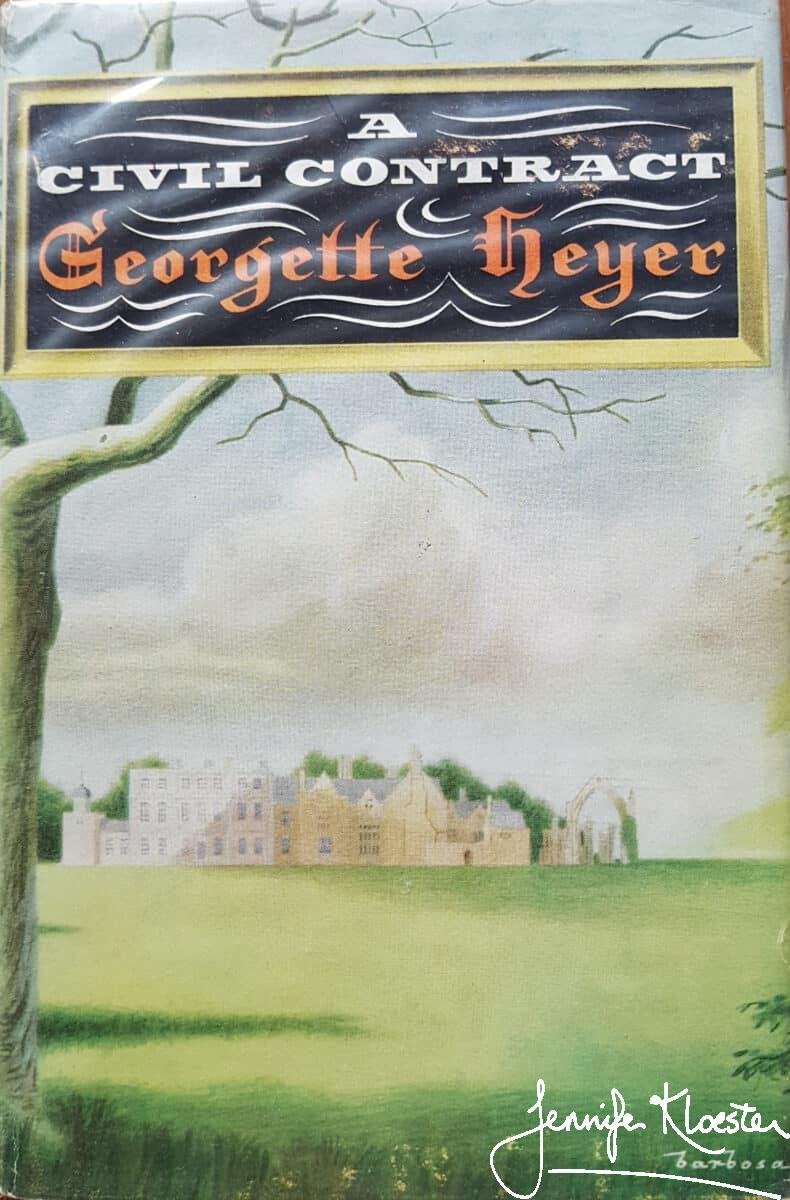
A complex novel
It is not surprising that Heyer found A Civil Contract a challenging book to write, for in many ways it is her most complex novel. A deeply emotional story, it is multi-layered in its characterisation and replete with historical detail. Unusually for Georgette, it is a book with a clear historical timeline, covering the seventeen months from January 1814 to June 1815 and culminating with the financial panic after the Battle of Waterloo. She wrote it in 1960, more than twenty years after writing her two most historical novels: An Infamous Army (1937) and The Spanish Bride (1940). In her late fifties Georgette’s memory was still remarkable and the historical detail so important to the very human story of A Civil Contract appears to have been effortlessly distilled into the narrative. But there is more than the military history so vital to her story. Here is a window into the problems of agriculture; encounters with Coke of Holkham; mention of the Corn Law riots; an account of the Prince Regent’s relationship with his estranged wife, Princess Caroline; his unhappy dealings with his rebellious daughter, Princess Charlotte – whose escape from Warwick House (as told by the real-life Miss Mercia Elphinstone at fictional Jenny’s party) – caused such a scandal; a description of Carlton House; an account of the Procession of the Allied Sovereigns; and the disastrous effect of the historical Dr Croft’s “reducing diet” on pregnant women, with its clever nod to his disastrous treatment of Princess Charlotte only three years later, among other things. With the lightest of touches, Georgette weaves her tightly-controlled and compelling story in and around a solid structure of Regency history.
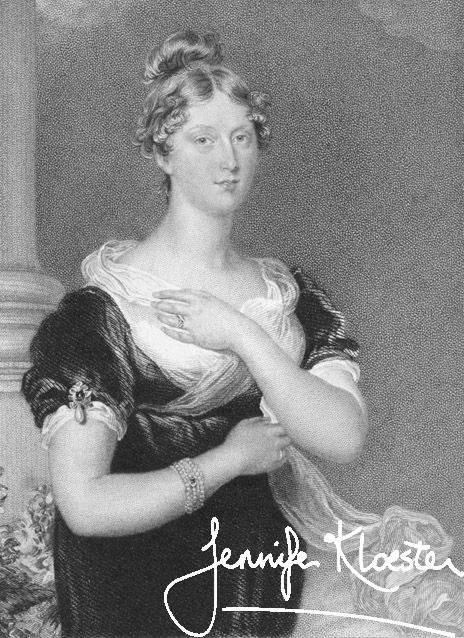
Princess Charlotte, whose stormy relationship with her father the Regent is touched on in A Civil Contract 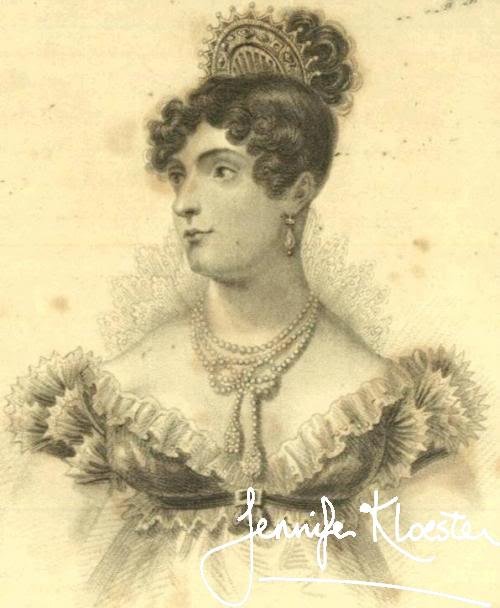
Princess Caroline, the Prince Regent’s estranged wife, makes a grand entrance at the theatre in A Civil Contract
A Love triangle
Not since 1937, when she had written about “the triangle of one girl and 2 men” in An Infamous Army, had Georgette included a love triangle in one of her novels. The plot of A Civil Contract, however, was to have a love triangle at its centre – only this time it would be one man and 2 women driving the action. The man is Adam Deveril, the new Viscount Lynton, whose only hope of saving the family estate is to marry an heiress. Unfortunately, Adam is already in love with the beautiful Julia Oversley, daughter of a moderately well-off earl. The woman he must marry is plain Jenny Chawleigh, the daughter of a fabulously wealthy, strong-minded, generous and (at times) vulgar Cit. Julia is 18, emotional and passionate with a head full of romantic ideals. Adam is 26, and has been in the army since his teens. A man of honour with a strong sense of duty, Adam also has a strong romantic streak and to him Julia is the “embodiment of a dream”. He loves her enchanting nature, her beauty and her sweetness while she thinks of him as a knight in shining armour. Adam and Julia believe themselves to be passionately in love and each is heartbroken when forced to accept that without money they can never marry.

Beautiful Julia Oversley embodies Adam’s romantic dream. 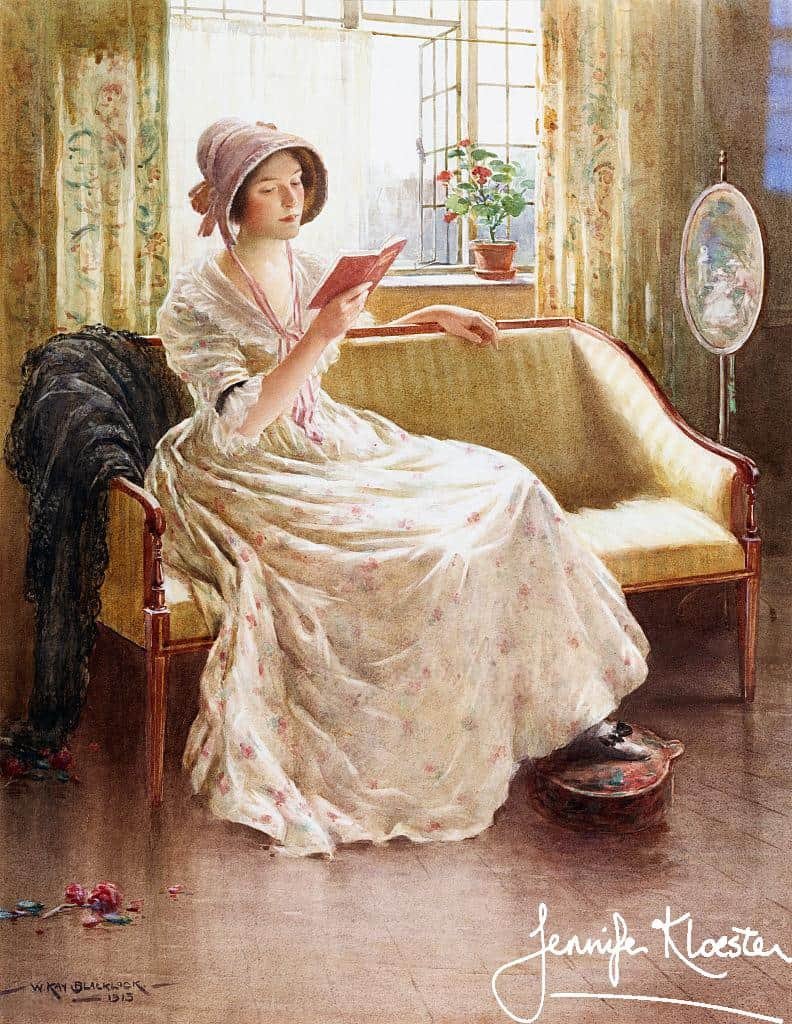
But plain practical Jenny Chawleigh will prove to be a better partner.
A marriage of convenience
Faced with financial ruin, at first Adam is appalled by the suggestion (from both Mr Wimmering, his man of business, and Julia’s father) that he marry an heiress in order to save the family fortune. Though he knows he must give up all hope of marrying the woman of his dreams, the proposal of a marriage of convenience goes against everything Adam holds dear. Even knowing that such marriages are surprisingly common does not lessen his distaste of the idea. It is not until he is visited by Mr Jonathan Chawleigh – the rich businessman who wishes his only child, Jenny, to marry a nobleman – that Adam is truly confronted with the advantages of such a match. He has told Mr Wimmering that “I don’t contemplate putting myself up for sale”, but his sense of obligation to his name and heritage, as well as to his two sisters for whom he must provide, compel him to reconsider. He accepts an invitation to dine at the Chawleigh’s magnificent residence in Russell Square. Here, amidst an opulence of furnishings, gilded mirrors, and objets d’arts, he meets Jenny. She has been at school with Julia and has met Adam before but, having eyes only for Miss Oversley, Adam has only the vaguest memory of Jenny. Unsurprisingly, at first this meeting is awkward and embarrassing. Even at 20 Jenny is shy and though she proves to be pleasant and intelligent Adam quickly perceives that she is also
“as unlike Miss Oversley as she could be. There was no brilliance in her eyes, no allure in her smile, no music in her flat-toned voice, and not the smallest suggestion of the ethereal either in her person or in her bearing. Where Julia seemed to float, she trod with a firm, brisk step; where Julia could be enchantingly arch she was invariably matter-of-fact. She enjoyed a joke, but did not always perceive that one had been made; and she looked as though she had more sense than sensibility.
Georgette Heyer, A Civil Contract, Pan, 1974, p.59.

A love so deep…
At first glance A Civil Contract may not appear to some readers to be a romance. For me, however, it is a deeply romantic book which reflects its author’s understanding of how a relationship can develop into one of lasting happiness and mutual content. It is this life that Jenny and Adam will build together. It is a life that comes, in part, from Jenny’s deep love for Adam, but also from Adam’s efforts to accept and appreciate her. The novel has much to say about love and its different manifestations. Jenny’s love for Adam is very different from Julia’s: Jenny’s allows her to subsume her own needs for Adam’s whereas Julia’s needs must always come first. Jenny has loved Adam from the very first but she hides her this from him because she knows he cannot – at least initially – return her feelings. Her love for him means that she will do all she can to keep Adam from hurt or discomfort. This is a self-sacrificing love and one of which some readers may disapprove, but it is also a love felt and expressed by a highly intelligent woman. Despite her claim that she lacks sensibility, Jenny is acutely perceptive, especially of other people’s emotions and it is this that drives much of the story. From the first she tells Adam: “I’m not the wife you wished for, but I’ll do my possible to behave as I should.” Jenny knows that for their marriage to be a success she will have to give – something that Adam himself will come to acknowledge in one remarkable conversation with Julia: “it’s she who gives, and I who take – but I can at least give her loyalty.” Jenny has an understanding far beyond Julia’s; she “studies to please” Adam, takes a genuine interest in his ambitions and strives to help him achieve them. She is, in the truest sense of the word, a “helpmeet” and she is willing to do whatever she can for him because she loves him. As she tells Adam’s sister, Lydia, late in the book,
“you thought I wished to marry a man that didn’t want me – was head over heels in love with another woman – just for the pleasure of getting a handle to my name!” Jenny broke in fiercely. “Well, I didn’t! I married him because there was nothing else I could do for him!”
Georgette Heyer, A Civil Contract, Pan, 1974, p.252.
A dream of love
Jenny’s dream of love at first seems impossible, but as the story unfolds, we gradually see that it is Jenny and not Julia who will make Adam the better wife. The theme of dreams plays an important role in A Civil Contract and here, more than in other of her books, Heyer allows her characters to reflect openly on their dreams. Jenny’s dream is that Adam will love her as he loves Julia and while she knows that this can never be, some part of her dream does come true and she recognises this at the end of the book: “She hid her face in his shoulder, thinking that she too had had an impractical dream.” For Adam, Julia is “the embodiment of his dreams” and on the day of her wedding to the Marquis of Rockhill he imagines her walking up the aisle on her father’s arm and knows that “he had reached the end of all dreaming. Whatever the future might hold there would be no enchantment, no glimpse of the isle of Gramarye he had once thought to reach.”
She is not any common Earth, Water or wood or air, But Merlin's Isle of Gramarye, Where you and I will fare! "Puck's Song" by Rudyard Kipling (the final verse)
Like Jenny, however, he also recognises the impracticality of his dream, and later he sees clearly how much better off he is with Jenny than he would ever have been with Julia. Heyer’s prose in A Civil Contract, is superb and in many ways the love depicted in the novel is her most realistic:
“He was not her lover, but perhaps, she thought, dropping over the edge of sleep, she could become his friend. Friendship might hold no place in a girl’s dreams, but dreams were insubstantial: escapes from reality into the glorious impossible. To consider the likely future was not to dream: it was to look forward: the essence of a dream was to ignore probability and one knew it, even at the height of fancy, when one imagined oneself the beloved of a slim young officer, whose eyes, weary with suffering, held so much kindness, and whose smile was so charming. No thought of friendship had entered plain, plebeian Jenny Chawleigh’s quite hopeless dream; but friendship was not to be despised after all: it was a warm thing, perhaps more durable than love, though falling such a long way short of love. One ought never to dream, though Jenny drowsily. It was better to look forward, and to picture oneself the trusted confidant of one’s shining knight rather than the object of his romantic adoration. But he wasn’t really a shining knight, she thought, snuggling her cheek into the pillow and sleepily smiling: only her darling Adam, who had to be tempted to his dinner, couldn’t bear to have anything in his room disarranged, and disliked breakfast-table conversation.”
Georgette Heyer, A Civil Contract, Pan, 1974, p.250-251
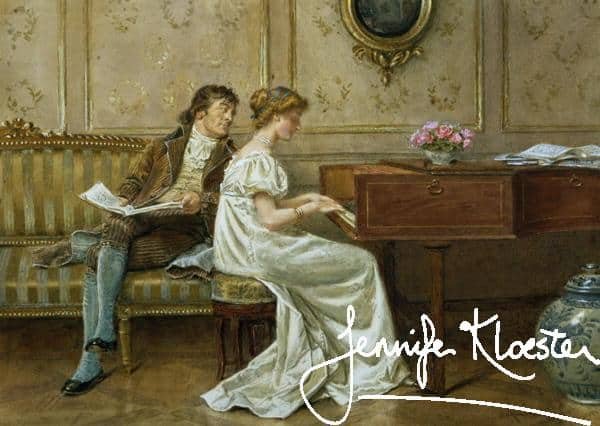
Picture: Wikimedia Commons
“I can’t live if I’m not loved!”
Heyer develops the all-important contrast between Jenny and Julia throughout the novel. Little by little the reader comes to see all the ways in which, as Adam himself eventually concludes: “I am much better off with my Jenny”. Julia’s character is volatile and at times childish. Despite an ability to be kind and generous to others, she is at base a self-centred young woman full of idealistic yearnings who declares passionately, “I can’t live if I’m not loved!” She believes herself in love with Adam but when told they cannot marry she enacts a highly emotional scene in which her self-delusion and love of the dramatic are made clear. Julia declares that she will live in poverty if it means being with Adam and he accepts her avowal as a sincere but naive example of her love for him. In reality, however, Julia has no notion of what it would mean to live outside of the privileged world in which she has been raised. As the novel progresses it becomes evermore apparent that Julia is no realist but a fantasist who must be shielded from many of life’s realities. She does not really think of Adam’ s feelings but only of her own. Heyer brilliantly depicts Julia’s gradual evolution and uses her interactions with Adam in a set of story-beats which each time turn from Julia to Jenny and which always show Jenny to greater advantage. It is Jenny and not Julia who genuinely desires the country life that Adam actually wants. Julia would never have coped with living most of the year at Fontley and in every situation where Julia would likely have become hysterical or demanding, Jenny is calm, thoughtful and kind. In the end Julia marries the Marquis of Rockhill – a man old enough to be her father. Like Jenny he too sees clearly and and understands exactly what he has signed on for in marrying Julia.
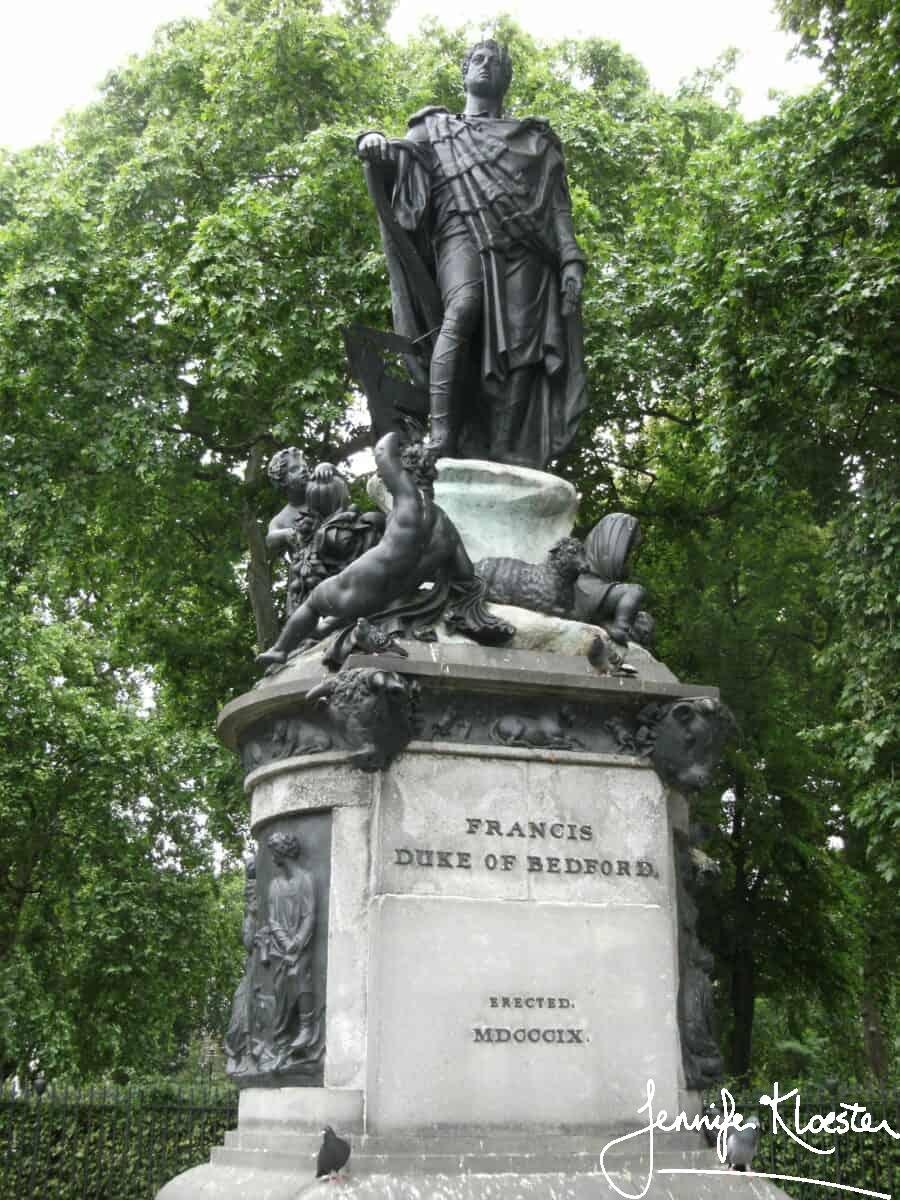
The statue of the Duke of Bedford with his plough in Russell Square. Agriculture is a vital theme in A Civil Contract 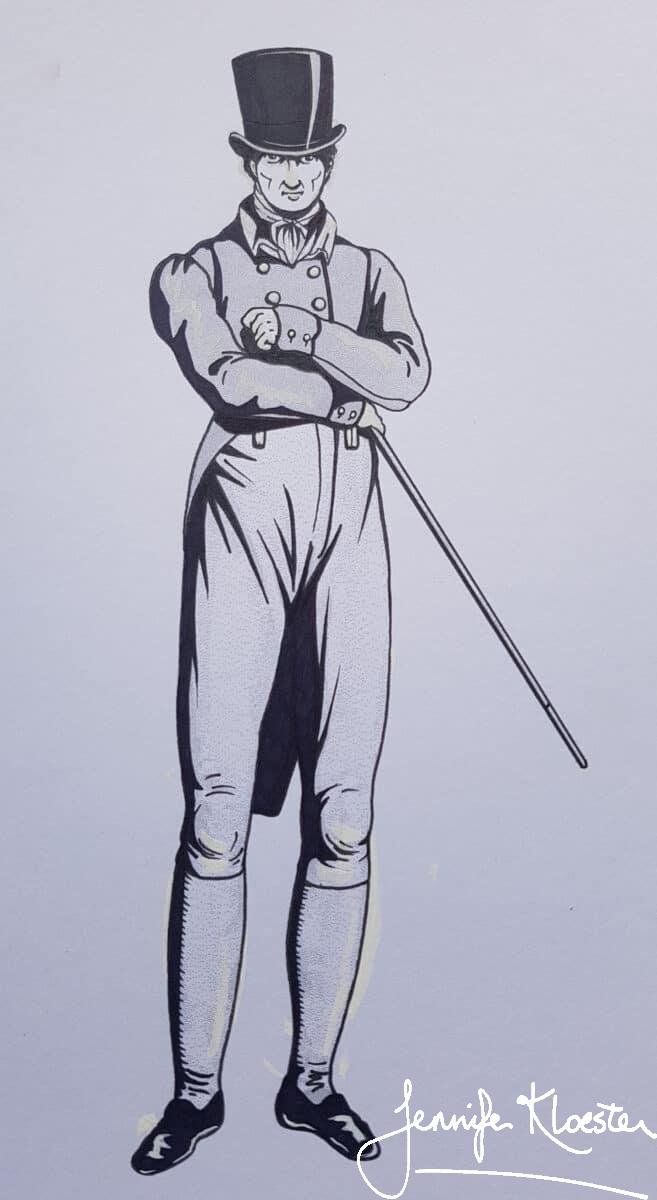
Jonathan Chawleigh “Favoured a mode that had been for many years worn only by respectable tradesmen”.
Mr Chawleigh “tried to steal the whole book”
Many thanks for the Contract – which looks well, I think, don’t you? Bits of it read quite well, & at last I feel that I did well by Mr Chawleigh –who, indeed, tried to steal the whole book, & had to be firmly pushed off the stage.
Georgette Heyer to A.S. Frere, letter, 19 August 1961.
An emotional book, A Civil Contract is also very funny. Among its cast of memorable characters, Mr Jonathan Chawleigh stands out as one of Heyer’s most brilliant creations. Blunt, honest and ignorant of tonnish ways, he is also acute, hardheaded, generous and kind. A loving and protective father, his wealth has given him immense power and at times this is displayed to disastrous effect. Jonathan Chawleigh is depicted with such skill that we see in him all of the contradictions and hypocrisies of the class system. Yes, he can be vulgar, but so can Adam’s mother. Yes, he can lose control of his emotions, but so can Julia. Throughout the novel, Mr Chawleigh’s sterling qualities shine through. In the beginning, he appears to Adam to be everything that Adam most dislikes; by the end of the book, however, Adam has learned a great deal about life and love and what really matters. He has also come to understand and appreciate Mr Chawleigh in ways he had never imagined to be possible:
“Mr Chawleigh,” interrupted Adam. “I owe you a great deal, I have a great respect for you – indeed, I have a great regard for you! – but I’ve not the remotest intention of letting you rule my household!:
Georgette Heyer, A civil Contract, Pan, 1974, p.266.
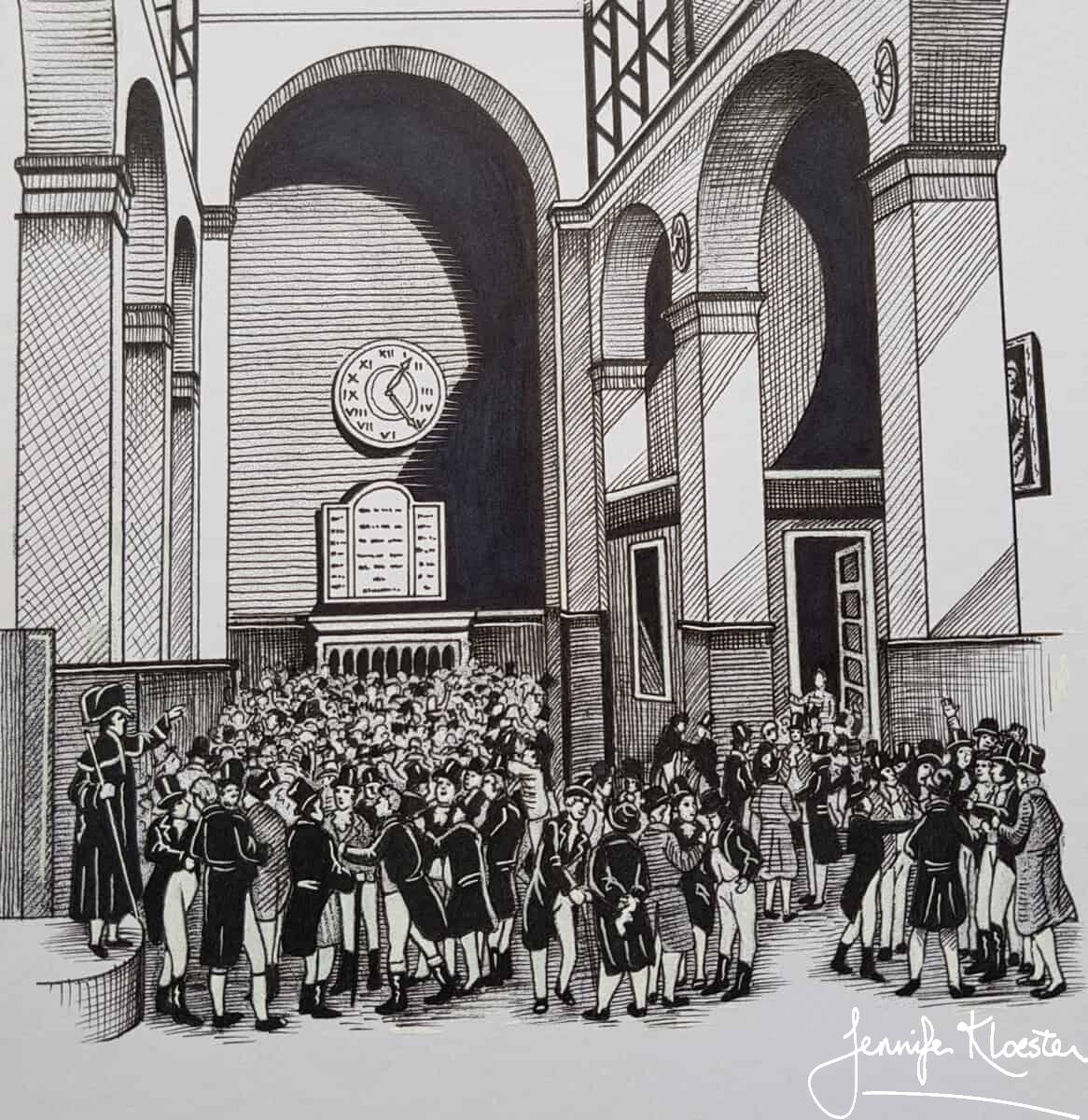
“A slight yen to do that”
“the culminating point the financial panic in London over Waterloo. I have always had a slight yen to do that – & to see Major Percy driving in a hired hack to Carlton House, with the two Eagles sticking out of the windows.”
Georgette Heyer to A.S. Frere, letter, 15 February 1960.
It is Mr Chawleigh who puts in motion the culminating scenes of the novel by instructing Adam to rush up to London in order to sell his government consols. Mr Chawleigh, by some means known only to the City of London men, has learned – as he thinks – of the British defeat at Waterloo. The news has caused the price of consols to fall and so he is desperate for Adam to sell his stock before he loses too much of his private fortune. However, Adam’s army experience kicks in and instead of selling his stock he buys more and makes a sizeable profit. Heyer was drawing on history in depicting this marvellous scene and there is no doubt that some people did make substantial profits from the brief financial panic surrounding Waterloo. Compared to some investors who purportedly made millions, Adam’s gain of £20,000 was relatively modest amd more akin to what the famous financier, Nathan Rothschild made at that time. There has long been a myth that Rothschild cornered the market because he had early information about the outcome of the battle. This is not true. Nor is it true that some investors had carrier pigeons to bring them news from Belgium – though that is another popular myth. The earliest recorded information about the outcome of the Battle of Waterloo came from a Mr C (likely not Mr Chawleigh, though it is a delightful coincidence!):
“Newspapers of the week that followed Waterloo reported that a ‘Mr C of Dover’ was present in Ghent when the news reached Louis XVIII on Monday 19 June and that he hurried to London, which he must have reached during the night of Tuesday to Wednesday – perhaps as much as twenty-four hours before the official word of the victory. This Mr C therefore has the distinction of having been the first person in London to know the French had been beaten – so far as the known, contemporaneous historical record states. But there is nothing in that record to connect Mr C with Nathan Rothschild.
Brian Cathcart, “Nathan Rothschild and the Battle of Waterloo” An excellent article which can be found here.
Beyond her glorious climax of Adam making his fortune, Georgette takes Adam back to Fontley where he is reunited with Jenny, encounters Julia at her most unreasonable, and discovers that the life he has – against all of his earlier wishes – is in fact the life which makes him the happiest. As Jenny (and Georgette) so rightly notes:
“After all, life was not made up of moments of exaltation, but of quite ordinary, everyday things. The vision of the shining, inaccessible peaks vanished: Jenny remembered two pieces of domestic news, and told Adam about them. They were not very romantic, but they were really much more important than grand passions or blighted loves: Giles Jonathan had cut his first tooth, and Adam’s best cow had given birth to a fine heifer-calf.”
Georgette Heyer, A Civil Contract, Pan, 1974, p.348.





6 thoughts on “A Civil Contract – Hidden Depths part 2”
Very good analysis of Adam, Jenny, spoiled Julia, and Mr. Chawleigh! I can’t understand people who read it and think it’s tragic Julia and Adam didn’t end up together. It would have been tragic for both of them.
Thanks, Sarah. Very kind of you and I agree. I always find it puzzling that anyone thinks that Julia would have made Adam a good life partner. Even at the end of the novel she still doesn’t understand his love for Fontley – not even after he explains it to her. She would never have wanted to spend much time there either. Julia is much better off with Rockhill just as Adam is with Jenny. It’s an amazing book!
A Civil Contract has always been one of my favorite of Heyer’s books. Your analysis is excellent. I’ve always found the slow growth of Jenny’s and Adam’s relationship to have all the elements of a real romance. The storm and fury of Julia’s passions and self-centeredness could never have supported a real relationship with Adam.
I totally agree with you, Lauren. Julia would have made Adam a terrible wife, especially given how much of his ambition was centred on Fontley and his acres – something she never understood. I know not everyone sees Jenny and Adam’s relationship as romantic but I think it is and also that it will continue to grow and develop and give them years of happiness. What could be more romantic than that? Thank you for your kind comment and for your reply.
I enjoyed your blogpost about A Civil Contract so much. Like you I didn’t enjoy it nearly as much when I read it as a young woman, but as I’ve gotten older I appreciate it much more. It is one of my favorites. It is very different from my other favorites, such as Cotillion, The Unknown Ajax and The Grand Sophy, but this just shows what a genius Georgette Heyer was.
Thanks so much and I’m glad you enjoyed the post. I think it’s one of the marks of Heyer’s brilliance that her novels change with the reader. I’m so glad that A Civil COntract is now one of your favourites. Mine too!